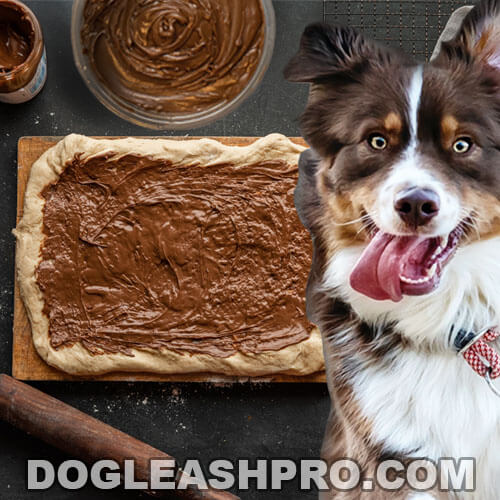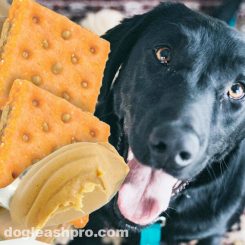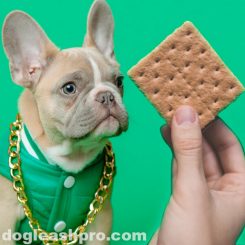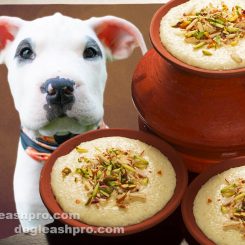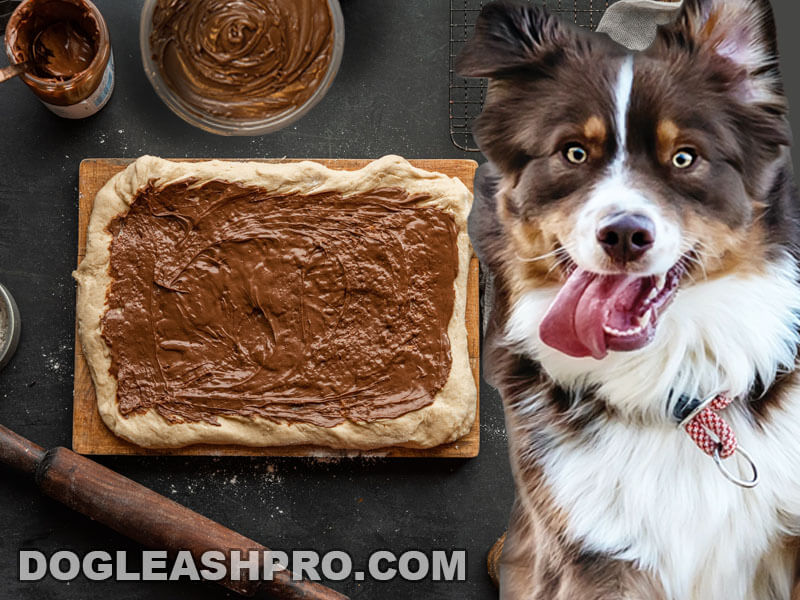
You’re probably having some warm waffles with Nutella. While making another one, your canine companions come running over and drooling heavily from the corner of their mouths. Should you let them lick the Nutella spread off your spoon? Before you do, you’ll want to read this first.
Can dogs eat Nutella? No, dogs should not eat Nutella since one of its ingredients is cocoa. Cocoa or chocolate is toxic to our canine friends and could lead to chocolate poisoning in dogs. Depending on how much Nutella your dog ate, it can result in serious illness. In addition to cocoa, there are other ingredients in Nutella that are not healthy for dogs. Thus, it’s best to avoid giving your dogs Nutella.
If your pooch manages to eat some Nutella off the jar or off your spoon, don’t fret! We’ve provided some solutions to help you. We will also discuss in-depth each ingredient in the Nutella jar and see how they can affect your dog’s overall health. We’ll also analyze the nutritional profile of Nutella so you know why it’s best to keep Nutella away from your furry friends.
Table of Contents
Can dogs have Nutella?
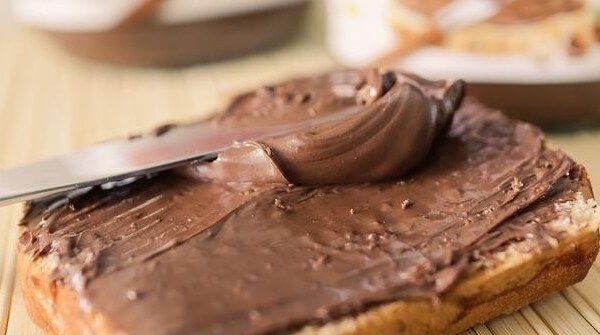
No, dogs should not have Nutella for many reasons. Let’s take a look at both the ingredients and nutritional profile of Nutella to see why.
Nutella Ingredients
- Sugar.
- Palm oil.
- Hazelnuts (13%).
- Skimmed milk powder (8.7%).
- Whey (milk).
- Fat-reduced cocoa (7.4%).
- Emulsifier: lecithin (soya).
- Vanillin: an artificial flavor.
Nutritional Profile of Nutella (2 Tablespoons or 37 grams)
| Name, Unit | Amount |
| Calories, cal | 200 |
| Sugar, g | 21 |
| Sodium, mg | 15.2 |
| Carbohydrate, g | 23 |
| Total Fat, g | 12 |
| Saturated Fat, g | 4 |
| Protein, g | 2 |
| Fiber, g | 0.999 |
| Iron, mg | 0.722 |
| Calcium, mg | 40 |
| Cholesterol, mg | 5.18 |
Is Nutella bad for dogs?

Yes, Nutella is bad for dogs. We can see from the ingredient list and the nutritional profile that Nutella is both unhealthy and harmful to our furry friends.
A good rule of thumb when looking at the ingredient list is to take a look at the first three ingredients. That’s because the first three ingredients you see are what make up the largest part of the Nutella spread.
In plain and simple terms, it is the sugar, palm oil, and hazelnuts that make up the largest part of the Nutella spread and what your dog may be ingesting should they manage to eat some Nutella.
Right off the bat, we can see that the first three ingredients are neither healthy nor safe for our four-legged friends.
Here’s why.
Tons of sugar in Nutella are extremely unhealthy for dogs
In just 2 tablespoons (37 grams) of Nutella, there are 21 grams of sugar! While it may not seem a lot to us, this amount of sugar is considered a lot for our furry friends.
It’s important to note that our furry friend’s daily diet requirement does not call for sugar in any way. In fact, our dogs don’t need sugar at all.
Sugar is actually harmful to our dog’s health. Let’s discuss this in more detail.
RECOMMENDED: Can Dogs Eat Reese’s Pieces? Here’s the Truth!
1. Too much sugar consumption from Nutella can lead to an upset stomach in dogs
If your dog manages to eat more than a tablespoon of Nutella, he may immediately feel the effects of consuming too much sugar. He will start to have an upset stomach.
That’s because too much sugar consumption than what he’s used to can disrupt the balance of bacteria and other essential microorganisms in your doggy’s gut. When this balance of bacteria and microorganisms gets disrupted, he will start to show signs of an upset stomach.
Signs and symptoms of an upset stomach include:
- Vomiting.
- Bloody diarrhea.
- Explosive diarrhea.
2. Sugar from Nutella can cause tooth decay and cavities in dogs
Just like us, when dogs consume too much sugary food, snacks, or treats, they may start to get cavities, bad breath, and tooth decay.
So what’s causing the tooth decay?
Well, the bacteria in your dog’s mouth is using the sugar that’s left on his teeth, tongue, and gum to produce acids. The acids then eat away at the enamel of your dog’s teeth. The enamel is important because it is the mineral or outer coating that protects your dog’s teeth.
If the enamel is gone, it can lead to tooth decay, cavities, and dental disease.
If you know your pooch manages to eat some Nutella, make sure to brush his teeth. We highly recommend that you brush your dog’s teeth with doggy toothpaste at least two or three times a week.
In addition, it’s crucial that you bring your pooch to the vet every year for their annual professional teeth cleaning.
You may be interested in: Can Dogs Eat Caramel?
3. Expect weight gain and canine obesity if your dog consumes sugar every day
Regularly allowing your pooch to consume Nutella is not a good idea. Doing so can also lead to weight gain and over the long term, it can lead to canine obesity.
That’s because sugary food or snacks are considered empty calories. They cause your furry family members to pack on the pound without receiving any nutritional benefits from it.
When our canine friends start gaining weight, it can affect them physically, mentally, and emotionally.
Weight gain can put stress on your dog’s joints and over time, it can lead to joint pain and injury.
Dogs that start to gain weight may also feel lethargic and no longer wants to play or go on walks anymore. When our pups aren’t as active, they will continue to put on more weight and have less energy. As we can see, it becomes a vicious cycle.
In addition to joint pain and feeling down, your pup may start to feel sad, angry, anxious, and depressed. This can negatively affect their immune system and cause problems like breathing difficulty, heart disease, arthritis, and even pancreatitis. All of this leads to low quality of life for your pooch.
You may also like: Can Dogs Eat Strawberry Jam? The Not So Sweet Truth!
4. Sugar from Nutella can affect your dog’s metabolism
With more and more sugar consumption, it can affect your dog’s metabolism as well. You’ll start to notice less muscle tone throughout his body. Instead of muscles, you’ll see more fat storage. All of this weight and fat will make it difficult for dogs to walk or perform any physical activities.
Rather, your Fido will be weaker and he may be prone to infections, other hormone-related diseases, and diabetes.
Let’s discuss diabetes next.
5. Eating too Sugar from Nutella can cause dogs to develop diabetes
Let’s not forget that dogs can develop Type II diabetes if they keep packing on the pound.
Your dog’s body will no longer be able to properly process sugar. As a result, there is excess sugar build-up in your dog’s bloodstream and the cells in your dog’s body aren’t able to use the sugar to produce the energy your dog needs.
For these reasons, it’s important that we keep Nutella as far away from our dogs as possible.
Check out: Can Dogs Eat Vanilla Wafers and Cookies?
Palm oil in Nutella is very toxic to dogs
The second ingredient used to make Nutella is palm oil. This means that palm oil makes up the second-largest amount in Nutella. This very reason is why we should not offer Nutella to our furry family members.
Some may whole-heartedly argue that palm oil is extremely toxic to dogs while others proclaim that palm oil isn’t so bad for dogs.
However, no matter which side you’re on, the consensus is that palm oil isn’t safe for doggy consumption.
That’s because palm oil does act as a laxative and if your pooch consumes too much Nutella, he may experience the following symptoms:
- Upset stomach.
- Intestinal blockage.
- Bowel obstruction.
- Vomiting.
- Diarrhea.
- Dehydration.
- Sickness.
- Pancreatitis.
Palm oil has a bad reputation because it isn’t an environmentally-friendly ingredient in most food. The reason why it has a bad rep and is considered risky for canine consumption is that palm oil is thought to have come from other toxic chemicals and products.
You’ll most likely find palm oil as a biofuel, in toiletries, and even in processed food.
Oh yea, did we mention that Nutella is technically a processed food?
You read that right, Nutella is processed food and its second major ingredient, palm oil, is concerning when it comes to our dog’s health.
If your pooch ate a small amount of Nutella, he or she should be fine. However, if he manages to eat a lot of Nutella, you’ll want to contact your vet right away since there’s a high chance that your pooch may become seriously ill.
Hazelnuts in Nutella may contain juglone and mycotoxins which are harmful to dogs
Depending on where the hazelnuts were sourced, they can contain high levels of mycotoxins and juglone.
This may put your dogs at risk of mycotoxicosis. Signs and symptoms of mycotoxicosis include:
- Vomiting.
- Excess salivation.
- Ataxia – difficulty walking or balancing. Your dog may walk around like he’s intoxicated.
- Hyperthermia – overheating in dogs.
- Fasciculation – involuntary muscle trembling. You’ll notice muscle contraction and muscles flickering under the skin.
- Tachycardia or abnormally fast heart rate.
- Liver damage or failure.
- Muscle Tremors (in severe cases).
- Seizures (in severe cases).
Dogs that have juglone poisoning may experience the above symptoms in addition to:
- Excess panting.
- Convulsions.
- Fever.
- Restlessness.
- Hyperresponsive to their surrounding.
If you suspect your furry friends have mycotoxins or juglone poisoning, we highly recommend that you call your vet right away.
Skimmed milk powder in Nutella is not safe for lactose-intolerant dogs
Another ingredient used in Nutella is skimmed milk powder, which is considered a dairy product. That’s because skimmed milk powder is made from cow’s milk and it is also known as dry milk or powdered milk. Essentially, water is removed from the pasteurized skim milk.
If you know your adult canine friends are lactose intolerant, please do not feed them Nutella. They may start to get an upset stomach minutes after consuming Nutella. Other signs of lactose intolerance in dogs include:
- Bloating.
- Diarrhea.
- Abdominal pain.
It’s important to note that most adult dogs are lactose-intolerant. Newborn puppies generally have an abundance of lactase enzymes to break down the sugar or lactose found in their mother’s milk. Once they start to wean off their mother’s milk, they make less and less lactase enzyme and thus become lactose intolerant.
Keep in mind that the lactose concentration of their mother’s milk is only about 3% while cow’s milk has a lactose concentration of 5%. As you can see, it’s difficult even for newborn puppies to properly digest cow’s milk with their abundance of lactase enzymes. Thus, adult dogs would definitely have a hard time digesting dairy products.
Is Nutella dangerous for dogs?
Yes, Nutella is dangerous for dogs because it is high in fat, sugar, sodium, carbohydrate, and calories. In just 2 tablespoons or 37 grams of Nutella, there are 200 calories, 12 grams of fat (4 grams saturated), and 23 grams of carbohydrates (21 grams of sugar).
As we can see, this nutritional content is not healthy for our furry friends. Depending on the size of your dog, his daily recommended dietary needs, and how active he is, ingesting just 2 tablespoons of Nutella regularly can lead to weight gain, diabetes, joint pain, and even pancreatitis to name a few.
Additionally, while there isn’t enough cocoa in Nutella to cause chocolate toxicity in dogs, other factors like the nutritional profile of Nutella and the other ingredients used to make Nutella can cause serious harm and illness to dogs.
The combination of high calories, high fat, and high carbohydrates is why Nutella is dangerous to dogs.
Keep in mind that Nutella is made for human consumption. Thus, it is a spread made for humans.
If you want to give your pooch some Nutella, be mindful of the 90/10 rule: 90% of your dog’s daily calories should come from a well-balanced and complete diet while only 10% of your dog’s daily calories should come from treats.
Nutella would be considered a treat in this case and however much Nutella you offer him should not exceed 10%.
Is Nutella toxic to dogs?
As we can see, Nutella isn’t exactly toxic to dogs. It’s just that many of the ingredients used to make Nutella are not safe for doggy consumption and can cause serious harm. In fact, many of the ingredients are actually unhealthy for our four-legged friends.
There isn’t enough cocoa in Nutella to cause chocolate poisoning in dogs since you can see that cocoa or “fat-reduced cocoa” is listed in the lower half of the ingredient list – the sixth ingredient to be exact.
However, other items like sugar, palm oil, hazelnuts, lecithin, and vanillin are not healthy for our fur babies for the reasons we discussed above.
So while Nutella isn’t exactly toxic to dogs, they aren’t the best for our dogs either. Due to this, we should avoid offering Nutella to our pups. If it’s a rare occasion, then that’s fine. However, try not to make it a habit of giving your pooch Nutella every day or regularly.
DISCLAIMER: THIS WEBSITE DOES NOT PROVIDE MEDICAL ADVICE
The information, including but not limited to, text, graphics, images and other material contained on this website are for informational purposes only. No material on this site is intended to be a substitute for professional veterinary advice, diagnosis, or treatment. Always seek the advice of your veterinarian or other qualified health care provider with any questions you may have regarding dietary needs.
NUTELLA is a registered trademark of FERRERO S.P.A.. Dogleashpro does not claim any ownership of the NUTELLA name, logo, or any identifying mark in any way. This article is for educational purposes only.
Resources:
https://en.wikipedia.org/wiki/Nutella
https://www.italyheritage.com/cuisine/food/nutella.htm

With over five years of specialized experience as an animal writer, my expertise lies in dog nutrition, health, behavior, grooming, and training. I am dedicated to delivering helpful and informative content that caters to the well-being of our furry friends. My primary goal is to empower pet owners with knowledge and ensure our canine companions thrive in health and happiness. In my free time, I love volunteering at local dog rescue centers.
